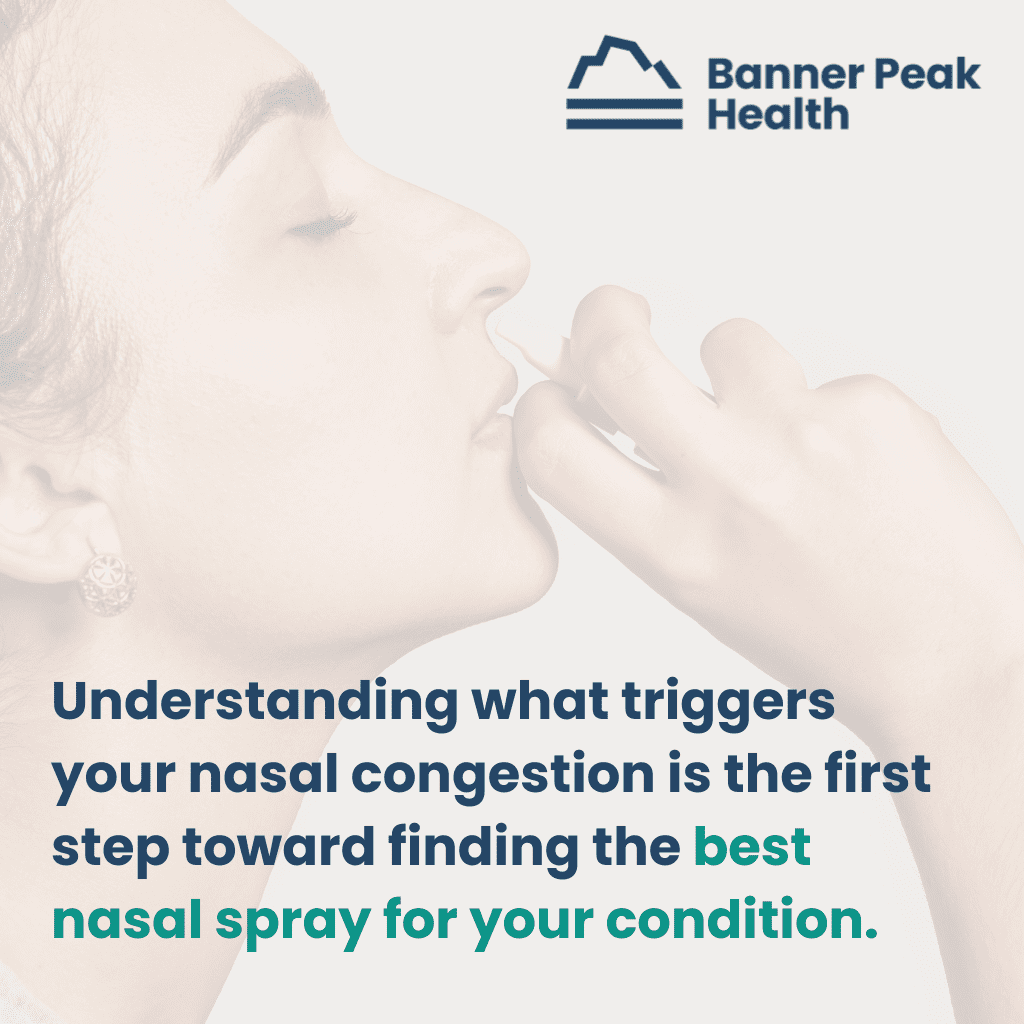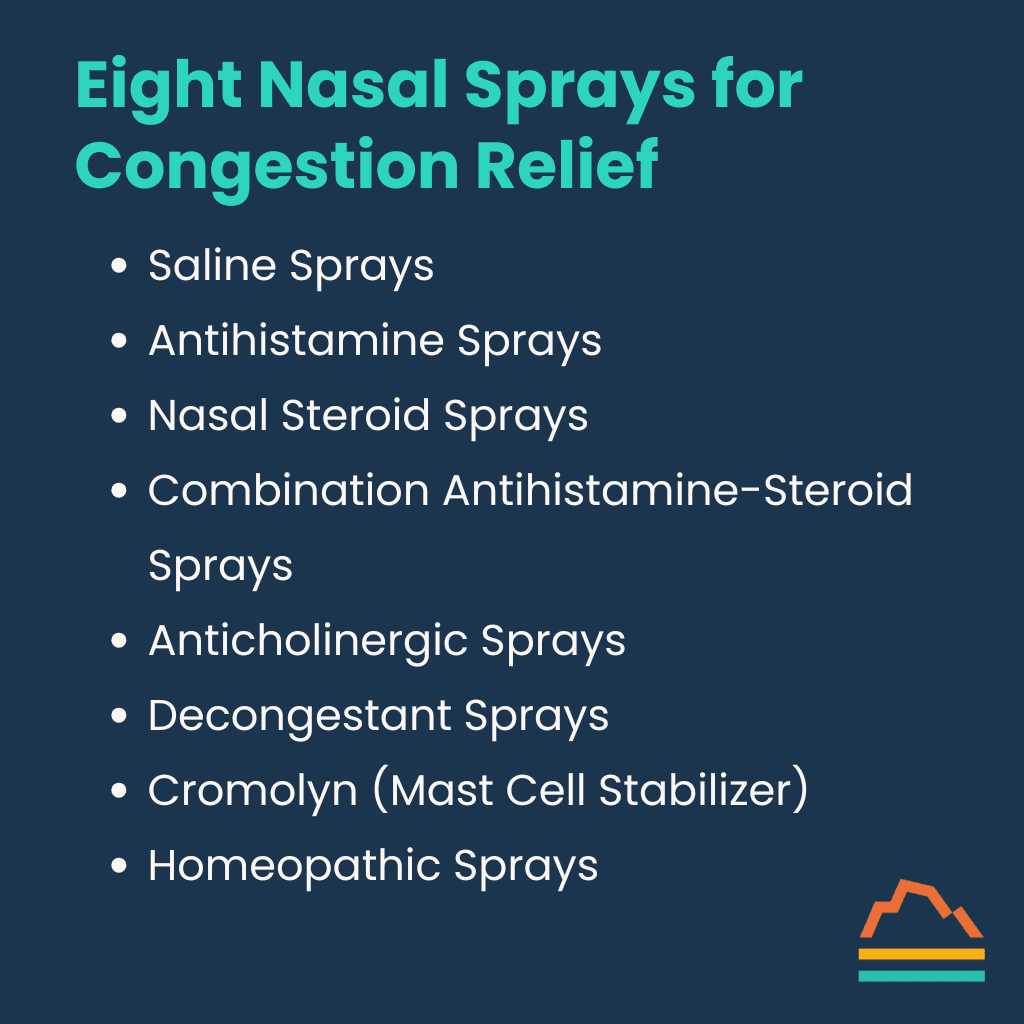Many people turn to nasal sprays for quick relief from stuffed noses, but with so many options available, choosing the right nasal spray for congestion can be overwhelming.
Before reaching for any particular nasal spray for congestion, it’s important to understand what’s happening inside your nose.
Understanding Nasal Congestion
When patients suffer from congestion, they’re often experiencing one or both of the following issues:
- Runny nose: Excessive mucus production
- Stuffy nose: Inflammation, making it difficult to pass air through the nasal passages
These symptoms stem from different causes, requiring different treatments. The best nasal spray for congestion in one situation might be ineffective in another.
Common Causes of Nasal Congestion
Understanding what triggers your nasal congestion is the first step toward finding the best nasal spray for your condition. Here are the most common causes I see in my practice:
Allergic Rhinitis (Hay Fever)
Your immune system overreacts to allergens, causing inflammation and increased mucus production.
Nonallergic Rhinitis
Nonallergic triggers, such as weather changes, cause congestion and/or a runny nose.
Occupational and Environmental Irritants
Cold air, cigarette smoke, air pollution, wildfire smoke, perfumes, and detergents can all trigger nasal congestion.
Medications
Many common medications cause nasal congestion as a side effect:
- Antidepressants
- Erectile dysfunction medications
- Blood pressure medications (particularly beta blockers and alpha blockers)
Chronic Alcohol Use
Regular alcohol consumption can trigger chronic nasal congestion and a runny nose, though the mechanisms aren’t fully understood as of this writing.
Nine Types of Nasal Sprays for Congestion
Now that we understand nasal congestion’s causes, let’s review different types of nasal sprays for congestion:
1. Irrigation
This isn’t technically a spray, but it’s important to include. Neti pots and similar devices flush out irritants with saline solution.
Important Safety Note: Always use distilled or properly boiled water and clean your device thoroughly to prevent introducing harmful pathogens.
2. Saline Sprays
These sprays moisturize the nasal passages and wash away allergens and irritants that cause inflammation. They’re safe for long-term use.
3. Antihistamine Sprays
Products like Astepro target H1 histamine receptors, blocking the histamine that immune cells release in response to allergens.
How they work: These sprays prevent histamine from binding to receptors, decreasing blood vessel dilation and reducing stimulation of sensory nerves that cause itching and sneezing.
Results appear within 15–30 minutes.
4. Nasal Steroid Sprays
Common options include Flonase (fluticasone), Nasacort (triamcinolone), and Nasonex (mometasone).
How they work: These sprays reduce inflammation by decreasing immune cell activity. When immune cells like eosinophils, neutrophils, and macrophages become less active, they produce fewer inflammatory mediators like histamine and cytokines.
Unlike antihistamines, steroid sprays take time to work — usually one to two weeks of consistent use.
5. Combination Antihistamine-Steroid Sprays
Prescription-only options like Dymista combine fluticasone (steroid) and azelastine (antihistamine) for dual action.
6. Anticholinergic Sprays
Products like ipratropium (Atrovent) target muscarinic receptors.
How they work: These sprays decrease glandular secretions, reducing mucus production and rhinorrhea (runny nose).
They’re particularly effective for patients with chronic runny nose without systemic allergy symptoms.
7. Decongestant Sprays
The most immediately effective (and potentially problematic) option. Brands include Afrin, Vicks Sinex, Sudafed OM, and Xlear, all containing oxymetazoline.
How they work: These target alpha-adrenergic receptors, causing vasoconstriction that reduces blood flow to the nasal mucosa. This decreases edema and mucus production and improves airway patency.
Critical warning: Never use for more than three days. Longer use causes rebound congestion (rhinitis medicamentosa), meaning your symptoms worsen with continued use.
8. Cromolyn (Mast Cell Stabilizer)
Products like NasalCrom stabilize mast cells, reducing their release of inflammatory mediators.
These products are most effective when used preventatively before allergy season begins.
9. Homeopathic Sprays
Products like Zicam claim to work through various mechanisms, but limited research supports their effectiveness.
Potential Side Effects of the Best Nasal Spray for Congestion
Even the best nasal sprays for congestion come with potential side effects:
All Nasal Sprays
Any nasal spray can cause irritation regardless of type.
Nasal Steroids
- Excessive dryness leading to nosebleeds (epistaxis)
- Impaired healing of nasal ulcerations
- Rarely, oral candidiasis (yeast infection)
- Possible association with glaucoma (low risk)
Anticholinergics
- Nasal and throat dryness
- Potential nasal bleeding
Decongestants
- Rebound congestion after three to five days of use
- Increasing dependence with continued use
My Recommendations
For most nasal congestion issues, I recommend a two-step approach:
- Mechanical removal of irritants. Start with saline irrigation or sprays to physically remove allergens and irritants. This reduces the burden of triggers causing your symptoms.
- Anti-inflammatory treatment. Follow with a nasal steroid spray to reduce inflammation. These can be used long-term if necessary.
For seasonal allergies, begin using nasal steroids two to three weeks before your typical allergy season starts.
For severe symptoms, you might temporarily add a decongestant spray (for no more than three days) while waiting for nasal steroids to reach full effectiveness.
For patients primarily experiencing a runny nose without other allergy symptoms, anticholinergic sprays often provide excellent relief.
For pregnant women or women trying to conceive who prefer to avoid steroids, cromolyn may be a good alternative.
Today’s Takeaways
The best nasal spray for congestion depends on your symptoms, their cause, and how long you’ve been experiencing them.
At Banner Peak Health, we don’t practice population medicine. We take time to understand each patient’s unique situation and recommend the right combination of treatments for their specific needs.
If nasal congestion is disrupting your life, let’s work together to find the right solution. We’ve got the time to research these options thoroughly and create a personalized approach for you.

Ari Katz, MD
Dr. Katz has dedicated himself to preventative medicine and building meaningful patient relationships. He joined Banner Peak Health as a concierge physician to provide the personalized, comprehensive care that allows him to focus on his four pillars of wellness and help patients achieve their optimal health.





